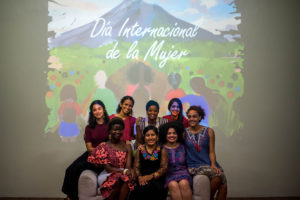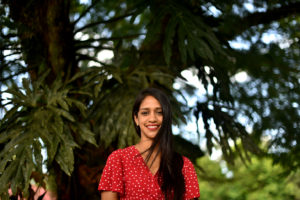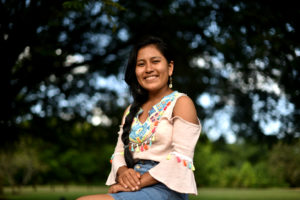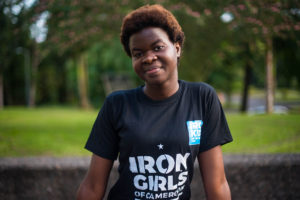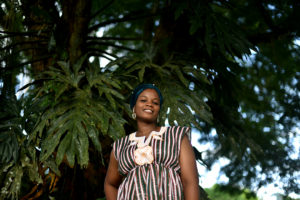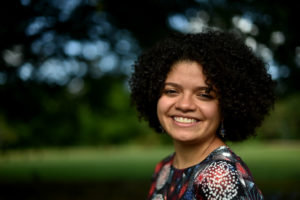Five stories of extraordinary women
In honor of International Women’s Day, EARTH University hosted the event “Las Mujeres de mi Tierra” (“The Women of My Land”). The gathering featured five extraordinary women. These are the stories they shared:
The first woman to speak about her journey is Natalia Daqui (’06, Ecuador). Raised by a conservative indigenous father and a liberal Brazilian mother, Natalia is multifaceted. As a child suffering from asthma, she wanted to play sports. Everyone told her she couldn’t, but still she tried – and discovered she could. That’s how she has gone through life since then, able to accomplish anything. She has faced scenarios deemed “for men” and has shown that she, too, can lead and create and not be limited to any rigidly defined gender role. Now a mother, Natalia believes in the great power of empathy. She recognizes that stumbling and picking oneself back up is necessary for growing stronger than before. She demonstrates her many beliefs through her actions.
In Natalia’s steady gaze, all the worlds she has built and all those she will build are drawn.
Tamia Sisa Gualán (’20, Ecuador) stands, exclaiming “I am proudly an indigenous woman!”. Tamia knows rural life: its distances and difficulties, as well as its many advantages. She has migrated several times in search of the opportunities she could not find in her remote village in the Ecuadorian Amazon. “I am weighed down by machismo, but I am weighed down even more by anti-indigenous racism,” she asserts. She speaks of being a seed that breaks so that it may flower. She talks about how hard it is to feel broken but also how vital it is for growth. In October 2019, one of the most important indigenous uprisings in Ecuador’s history took place, and women were the protagonists, becoming warriors in the fight for their rights. “Those are the women of my land, the voice of the land itself speaking,” says Tamia, who – like her people – used her struggles to grow stronger, to flourish.
Tamia, like the indigenous women who have shaped her, works to plow the mountain where she also sows peace.
With all the power of an African amazon, Chi Brenda (’21, Cameroon) begins to tell her story. She comes from a country where droughts often last seven months. As an adolescent, Brenda studied in an isolated boarding school. Whenever there was no rainfall, she and the other girls had to walk long distances to bathe in a river. The inconvenient practice became more complicated whenever they were menstruating. She and the other girls were prone to vaginal infections from dirty river water. When Brenda arrived at EARTH, she learned from other women about alternative methods of menstrual care. After researching her own cycle, she deemed the menstrual cup to be the right tool for women back home. She then sought funds to buy cups and deliver them to Cameroonian women, with support from differente organizations, including the Costa Rican nonprofit Iron Kids of the World. Brenda gave workshops back home about the cup and the menstrual cycle – in the process, improving the lives of over 300 women.
Brenda, like many women, has firmly stood her ground through storms, fighting for her place on earth – to triumph without fear.
Hajaratu Wumbei (’15, Ghana) and the African women of her land have always lived in an unequal reality, having to work hard to minimize the gender gap that impedes them from reaching their potential. As a child, Hajaratu would help her mother with the housework, sell filtered water on the streets to support her family, and also study. She was the only daughter among the family’s five children and therefore the only one expected to do so many tasks. Why? “Because I was the only girl,” she says. Shaking away nasty stigmas, she came to EARTH – to study for a career once considered men’s work. Hajaratu returned to Ghana with a management position in cacao production at ECOM, a global company that works with thousands of small-scale farmers. She is the first woman to secure a management position in this company. Now a wife and mother, she is eager to empower more women to overcome fears and believe in their own abilities – just like she did.
With courage, Hajaratu has faced the known and the unknown.
Nicaraguan singer-songwriter Ceshia Ubau, whose voice and lyrics weave together the women’s stories, sings the chorus of her song “Las Mujeres de mi Tierra”:
|
Original Spanish lyrics
Las mujeres de mi tierra Se entregan al amor Por la vida y no niegan Sus raíces ni su son Gritan alto yo soy libre Como mariposa en flor Y con valentía enfrentan Lo que conocen y lo que no
|
English translation
The women of my land Give themselves to love For life, denying neither their roots nor their rhythm They loudly shout “I’m free” Like a butterfly upon a flower And bravely face What they know and what they don’t
|
Inspired by her grandmother’s struggle to safeguard her family during the Nicaraguan Revolution, Ceshia wrote this song a few years ago. Today, it is an anthem for the Nicaraguan women who continue to fight for their rights. Ceshia fled her home country due to the political situation and armed conflicts of recent years, migrating to Costa Rica.
Ceshia was born early in the midst of chaos. The pediatrician recommended that her parents play classical music to stimulate the premature newborn’s brain. At six months old, Ceshia was already being consumed by the music; it kept her alive. Years passed, and then came the poetry. Ceshia brims with lyricism, which she uses, along with music, as a tool of resilience – to live through her sorrows, to face violence unflinchingly, to tell her story fully, to empower herself and others.
Ceshia roars, through her poetry, that she is as free as a butterfly among flowers.
At EARTH, we commemorate the struggles and contributions of women around the world. From the classroom, the field, and the community, we strive to empower each and every woman who shapes others with kindness and advances peace and prosperity for all.

